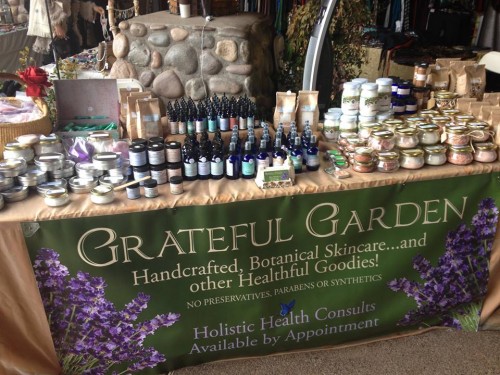Tiffany shares her thoughts on Essential Oils for you, your health and your thyroid!
(Plus, favorite Tiffany-approved, thyroid-friendly products)
Tiffany is a Medical Liaison, specializing in Thyroid Health and personal Aromatic Medicinal and synthetic free beauty products. Read more about her, here and check out all of her AMAZING, handmade with love, products at Grateful Garden.
Essential Oils Q & A’s
1) Okay. Which brands of essential oils would you recommend and why? For instance, most people seem to go for Young Living, Doterra or Pure Pro.
 There are lots of good essential oil companies. Important things to look for are gas chromatography mass spectrometry (GCMS) reports as well as the country of origin, specific species and chemotype (for some), type of distillation or expression method (steam, absolute, cold press, etc), as well as the parts of the plants used. Those are extremely important in knowing, as it often changes the % of constituents (both beneficial and harmful). I personally prefer distributors who have relationships with the farms that distill, as well as organic and wild harvested choices, when available, and of course, sustainably grown and ethically harvested for some like Sandalwood in particular. I buy from many different distributors, each at different times. After many years, I have found that no one particular distributor has ALL of the best oils at one time. This is just my experience. Young Living and doTerra can be very beneficial mediums for those that are interested in being able to purchase ready packaged essential oils that are of reputable quality. I LOVE this article for more information and in depth explanation about quality, values and grades, TheIDA.com
There are lots of good essential oil companies. Important things to look for are gas chromatography mass spectrometry (GCMS) reports as well as the country of origin, specific species and chemotype (for some), type of distillation or expression method (steam, absolute, cold press, etc), as well as the parts of the plants used. Those are extremely important in knowing, as it often changes the % of constituents (both beneficial and harmful). I personally prefer distributors who have relationships with the farms that distill, as well as organic and wild harvested choices, when available, and of course, sustainably grown and ethically harvested for some like Sandalwood in particular. I buy from many different distributors, each at different times. After many years, I have found that no one particular distributor has ALL of the best oils at one time. This is just my experience. Young Living and doTerra can be very beneficial mediums for those that are interested in being able to purchase ready packaged essential oils that are of reputable quality. I LOVE this article for more information and in depth explanation about quality, values and grades, TheIDA.com
2) Can anybody use essential oils? The point here is that you actually need to know what you are doing as essential oils can have many contraindications. For instance, there are certain oils you shouldn’t use on somebody who is pregnant, right?
 Yes exactly. However, I think everyone can use essential oils depending on the oil (some are quite toxic and not for anyone), type of application, the amount and the frequency, as well as general health. Infants are among the most fragile group as their metabolic and waste processing systems are not fully developed until a year old. Those undergoing chemo and/or radiation are also a very specific consideration group, as many essential oils can alter chemo potency, uptakes and efficacy. There are many considerations to be taken in for all people… including age, chronic or acute conditions, pregnancy, circulatory issues, medications being taken, the method of use (inhalation, ingestion, topical application, suppository, etc), which essential oil (and sometimes species and chemotype) is being considered (not all are for everyone), where being applied and how often. There are many different considerations to take before usage.
Yes exactly. However, I think everyone can use essential oils depending on the oil (some are quite toxic and not for anyone), type of application, the amount and the frequency, as well as general health. Infants are among the most fragile group as their metabolic and waste processing systems are not fully developed until a year old. Those undergoing chemo and/or radiation are also a very specific consideration group, as many essential oils can alter chemo potency, uptakes and efficacy. There are many considerations to be taken in for all people… including age, chronic or acute conditions, pregnancy, circulatory issues, medications being taken, the method of use (inhalation, ingestion, topical application, suppository, etc), which essential oil (and sometimes species and chemotype) is being considered (not all are for everyone), where being applied and how often. There are many different considerations to take before usage.
 3) What are the most popular essential oils?
3) What are the most popular essential oils?
- Lavender
- Eucalyptus
- Sweet Orange
- Frankincense
- Sandalwood
- Peppermint…there are so many!
Here is a list of wonderful EO’s… (coming soon)
4) How often do you use them in your daily practice?
I am exposed to essential oil’s multiple times during the day, particularly by inhalation. I am careful to be in an area that is very well ventilated. Even too much of a good thing can be potentially problematic in the long run. And of course, I love my complexion oils and deodorant, so I use them topically, well diluted, a couple of times daily as well.
5) What are different ways to use them? For instance, for the food-grade ones such as YL, you can add them to water, but you can also add them to a cream (such as massage cream) or put them in a diffuser to inhale them, right?
‘Food grade’ essential oils have never been ‘graded’ by an independent regulatory body, nor is there an independant, third party standardized ‘grading’ system, other than ISO, AFNOR, GRAS, GC/MS and Organic certified. The manner in which they are marketed is a whole other ballgame. It is never a good idea to add essential oils to water as they are hydrophobic, meaning that they will repel water. For ingestion, they should be added to some type of fat, oil or enteric coated capsule when needed, to protect the sensitive mucous membranes. *Ideally, ingestion should always be consulted with a qualified aromatherapist for consideration of safe and applicable usage, as ingestion is one of the most invasive methods of use and may not be necessary or even warranted. Essential oils can be utilized by topical application, inhalation, ingestion, as well as by suppository through rectal or vaginal application.
6) How should they be applied to the skin? When they are applied to the skin there are many considerations to have one being how often will they be used the nature of the need as well as frequency of use type of skin.
Skin application will all depend on multiple considerations… general health, frequency being used, purpose of usage, condition and location of skin, specific oil being considered, etc. Regardless, always well diluted (% will also vary significantly with different essential oils and applications).
7) Do you always have to use a barrier cream or oil rather t han apply them directly?
han apply them directly?
This is a subject of much debate, but in my opinion, yes. Research (both human and animal) has shown direct correlation between the higher the % used and the greater the potential for sensitization and other problems. Personally, I do not understand why one would NOT want to dilute…it penetrates the skin better, keeps the individual significantly safer and is just as effective. Plus it saves you money and energy wise shows a much greater respect for the actual plant itself. These are highly potent substances, significantly more potent than what you would get directly from the herb, flower, bark, resin, etc.
8) Which do we need to be most cautious of, when applying directly?
You could use Lavender, maybe in a pickle. Otherwise, I will not recommend applying directly. There is just no need in my opinion. Carrier oils can add just as much to a formula or injury as the essential oils themselves. Diluting makes them much safer, and just as effective, sometimes, even moreso.
9) Do some of them burn and do you have a story about that? (Tiffany to explain more…)
MANY of them will burn…particularly clove, cinnamon and other ‘hot’ oils.
10) What is the history of EOs. For instance, Thieves oil is said to have come about because thieves doused it on themselves to protect themselves from the Plague when they pilfered the houses of plague victims.
Yes, it’s a great legend!
11) Do you have a favorite one and why?
If I had one that would be my favorite for multiple uses it would be Lavender Lavender can be used for a wide variety of problems and situations and is a fairly safe essential oil to use on children the elderly and…..


